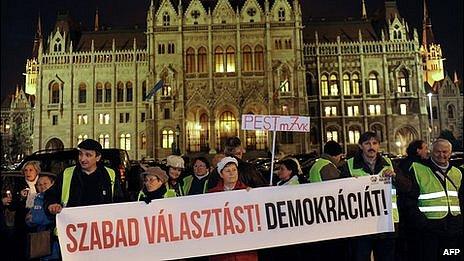Hungary top court voids election law in blow to Orban
- Published

Hungary's constitutional court has struck down a controversial electoral law that critics said would have favoured the ruling party, Fidesz.
The court objected to a requirement that voters register no later than 15 days before polling day.
Some other provisions were also deemed to be unconstitutional.
The conservative party of PM Viktor Orban dominates parliament. Last year Fidesz changed some other laws amid EU pressure over democratic standards.
After Friday's court ruling the head of the party's parliamentary group, Antal Rogan, said the new voter registration system would not be introduced for the 2014 general election.
The new electoral law was adopted by parliament last November, but then President Janos Ader referred it to the constitutional court.
He also highlighted public concern about the law's provisions on election campaigning and advertising.
The court ruled that the law restricted voter rights to an unjustifiable degree, the Politics.hu news website reports.
The court objected to a proposal that political ads be restricted to the publicly run media, calling it a grave violation of freedom of speech.
The court also opposed proposed bans on cinemas screening political ads during the campaign and on the publication of any election-related opinion polls in the six days prior to election day.
Last year the European Commission - the EU's executive arm - took legal action against Mr Orban's government over reforms to Hungary's central bank, data protection and the judiciary.
There have been many protests in Hungary against Fidesz's laws which, in the eyes of critics, infringe on civil liberties.
Mr Orban has accused the EU of interfering in Hungary's domestic affairs. He has argued that major reforms are necessary to "renew" Hungary's institutions, saying the legacy of communism has not yet been eradicated.
- Published13 February
- Published17 January 2012